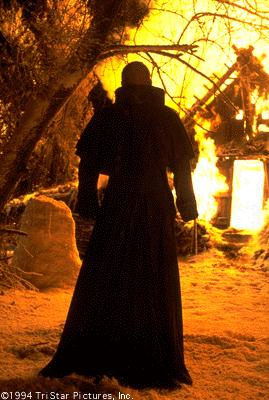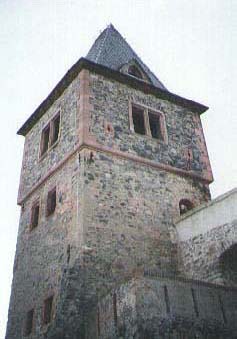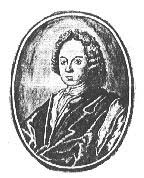

| When one mentions
the name Frankenstein, usually one thing comes to mind: a creature pieced
together from decomposing corpses. A creature betrayed by his maker—an
overzealous scientist who is weakened by his own passion for life.
Is there a connection between the castle Frankenstein and the novelist
Mary Shelley? There are many scholars who believe that the connections
exist.
|

The Courtyard ruins |

Mary Shelley |

|
This is how the novel Frankenstein was conceived. It was 1816 and on Lake Geneva during a dark and stormy summer night, four friends gathered in a stately living room by a glowing hearth. The English poet, Lord Byron, his personal physician John Polidori, Mary Shelley and Percy spent the evening entertaining one another with German ghost stories. Finally, Lord Byron made a dare, he challenged the members of the group to conjure up a story of horror. "We will each write a ghost story," he stated. |
| And a story Mary Shelley did write. Frankenstein was published two years later in 1818. Victor Frankenstein, obsessed with the nuances of the beauty and mysteries of life, he haphazardly pieces together the "creature." Shocked by its appearance, Victor rejects and abandons his creation, leaving his monster to fend for himself and run amok amongst the countryside. A familiar motif in twentieth century novels and film, the story of Victor Frankenstein has been romanticized (Mary Shelley’s Frankenstein, 1994) regurgitated (the Universal and Hammer Frankenstein films) and reinvented (2001: A Space Odyssey, Westworld, Alien). |  |
 |
The question is, what ties does the castle Frankenstein have with Mary Shelly’s novel? In 1814, Mary Shelley and her lover and later husband, Percy Shelley were traveling through Germany. It is believed that the Shelleys visited the Burgstasse region during a river boat trip. In the early 1800s, the castle was visible from the Rhine and possibly provoked an excursion into the surrounding villages. Why are some literary scholars convinced? There is a connection between Victor Frankenstein and Konrad Dipple, a resident and alchemist who was born on August 10th, 1673 in the Frankenstein castle. |
| Konrad Dipple
was a rogue student at the University of Giessen. He was a scholar
of radical thought and left the University after finishing his thesis entitled,
De Nihilo (On Nothing), which implied that he had learned very little,
or nothing from his instructors. It was then that began to travel
the countryside, lecturing on subjects as divinity and astrology.
Later he relocated at the castle Frankenstein, the place where he felt
his family roots. Even though Dipple had no common blood with the
family of Frankenstein, he considered himself a member of the Frankenstein
legacy.
He became known as "Dipple the Alchemist"
as was believed to have been trying to create a chemical that would prolong
one’s life. Rumors circulated stating that he was collecting body
parts to assist in the making of this formula. Dipple claimed that
his formula was to allow him to live to the age of 135 but it is believed
that he died by drinking his own potion. On the morning of April
24th, 1734, Dipple’s body was found by one of his friends. He became
another legend in the history of Frankenstein.
|

Konrad Dipple |
| Could Mary Shelley been told of Konrad Dipple during her presumed visit of the castle? There are connections in her story that affirm this thought. The character of Victor Frankenstein is similar to the Alchemist Dipple. Both had a passion for life. Both left their university studies to delve into a dangerous science. Both died tragically from the makings of their obsession—the obsession of harnessing life and the futile attempt to reject the manifestation of death. |